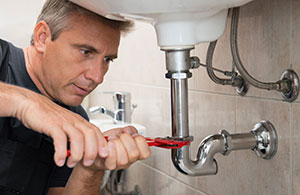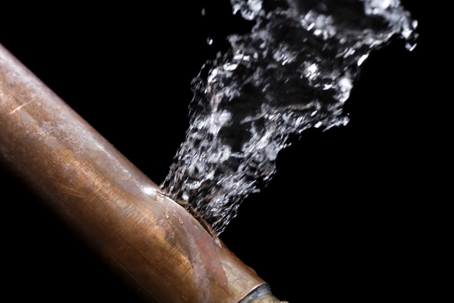Right here on the next paragraphs you might get more great help and advice regarding What to Do While Waiting for an Emergency Plumber.

Plumbing emergencies can strike at any time, creating stress and anxiety and prospective damage to your home. Whether it's a burst pipeline, a clogged up drainpipe, or a leaking faucet, knowing how to take care of the scenario up until an expert plumber arrives can conserve you from additional issues. This short article offers essential emergency situation pipes pointers to aid you minimize damages and gain back control throughout a plumbing crisis.
Turn Off the Water Supply
The first step in any kind of plumbing emergency situation is to turn off the water supply. For local problems, such as a leaking tap or bathroom, shut off the valve near the component. In the case of a major leakage or burst pipeline, find your home's main water shut-off shutoff and transform it off instantly. Recognizing the place of these valves ahead of time can save valuable time throughout an emergency.
Address Tiny Leaks with Temporary Solutions
Small leakages can swiftly become substantial problems if left uncontrolled. Utilize these temporary repairs until specialist help gets here:
While these fixes aren't irreversible, they can aid decrease water loss and damages.
Unclog Drains Pipes Securely
A stopped up drainpipe can be a discouraging and untidy problem. Here's how to tackle it:
If these methods don't function, stay clear of using excessive force, as it might get worse the clog.
Take Care Of Overflowing Toilets
An overflowing bathroom can trigger prompt disorder. Here's what you ought to do:
Turn off Your Hot Water Heater
In particular emergency situations, such as a ruptured pipeline, it's important to shut down your hot water heater. This protects against getting too hot or damages to the device when water quits moving. Switch off the power supply to the hot water heater (electrical or gas) and allow it cool off to prevent prospective risks.
Briefly Stop a Burst Pipe
A burst pipeline can bring about substantial water damages in mins. To alleviate the problem:
Call a specialist plumbing professional right away to address the trouble completely.
Deal With Frozen Pipes Carefully
In cooler environments, frozen pipes are an usual emergency situation. If you think a frozen pipeline:
Protect against Further Damages
Taking fast action to reduce damages can save you money and time in the future. Here's exactly how:
. Have an Emergency Pipes Kit
Prepare a fundamental plumbing emergency situation kit to manage minor problems effectively. Your set needs to include:
Having these tools accessible can make a significant distinction in your ability to handle emergency situations.
Know When to Call a Professional.
While quick fixes can assist momentarily, specific pipes issues need prompt professional interest. Call a plumbing professional if:.
Quickly calling a specialist ensures the problem is solved appropriately and prevents additional issues.
Verdict.
Plumbing emergencies can be overwhelming, however with the appropriate expertise and tools, you can manage the circumstance successfully up until aid gets here. By switching off the water, addressing small leaks, and using short-term repairs, you can lessen damages and maintain your home safe. Bear in mind, these pointers are temporary solutions; always speak with a certified plumbing to manage the source of the issue. Prep work and fast reasoning are your finest allies in any type of plumbing emergency.
How to Manage a Plumbing Emergency Until Help Arrives
Plumbing emergencies can be stressful, but keeping calm can help minimize damage to your home. Below are steps to handle a plumbing emergency, but always call a plumber for assistance. It’s safest to have a 24/7 emergency plumbing team readily available, so keep their number in your contacts list for easy access.
Shut off the water: Act quickly to turn off the water source during an emergency. For toilets, turn the water valve at the base or behind the commode. For larger emergencies or flooding, turn the main valve in your home clockwise. Turn off the water heater: Prevent damage to your water heater by switching it off after shutting off the main valve. If you have a gas water heater, turn off the gas supply first. Must Open drains and spigots: Even after shutting off the main valve, your pipes may still have water. Reduce potential damage by turning on spigots outside your home and clearing water with the garden hose. Avoid using chemical cleaners during an emergency. Address small leaks: If you find a small leak, use the plumber’s tape or place rags and towels around the pipes to prevent further damage. Inform the plumbers about these leaks upon their arrival. Call for help: Remember to call a plumber as soon as the emergency occurs. An early call can provide initial assistance and help determine if the situation is too dangerous. If professionals or government officials advise you to leave your home during an emergency, listen and prioritize your safety. Plumbing Emergency Examples and Immediate Fixes
Dealing with a plumbing emergency can put enormous stress on homeowners, leaving them uncertain about the steps to take. This detailed guide delivers concise, direct advice for swiftly tackling typical plumbing dilemmas. It includes actionable measures for dealing with everything from burst pipes to toilets that won’t overflow, helping reduce harm and quickly bring back normalcy.
Burst Pipes
Burst pipes result from intense pressure from various causes like freezing temperatures, corrosion, or physical damage that leads to a pipe rupturing.
Solutions:
Immediately shut off the main water supply to halt the flow of water. Drain the remaining water in the system by opening all cold water taps to prevent further damage. For a temporary fix, use a pipe repair clamp or wrap a piece of rubber around the burst section and clamp it tightly with hose clamps. Call a plumber for a permanent fix. Severe Leaks in Faucets or Toilets
Solutions
Locate and close the local shut-off valve to stop the water flow to the leaking fixture. Place a bucket underneath to catch any drips and reduce damage. In the case of a toilet, lift the float in the tank to prevent more water from entering the bowl and turn off the water supply valve. Contact a plumber to address the problem correctly. Leaking Water Heater
Turn off the water supply to the leaking water heater. If it’s electric, switch off the power at the circuit breaker; if it’s gas-powered, turn off the gas valve. Avoid attempting to repair yourself, as this may involve significant danger and complexity. Seek the assistance of a professional plumber who can provide a safe and appropriate resolution. https://www.showtimeplumbingllc.co/expert-tips-for-managing-a-plumbing-emergency-until-help-arrives

Do you like reading about Expert Tips for Managing a Plumbing Emergency Until Help Arrives? Create a comment below. We would be glad to find out your reactions about this posting. In hopes that you come back again later on. Liked our article? Please quickly share it. Help other people check it out. Thank you so much for taking the time to read it.
Call Today